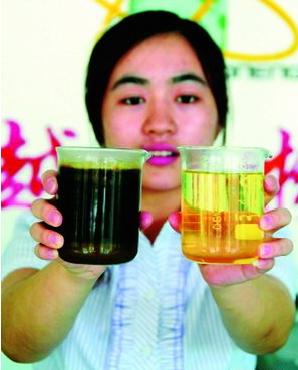 Last year, Zhang Weiming and his company in Changzhou Wujin, one of the largest biorefinery businesses in the country, processed 50,000 tons of waste cooking oil and extracted over 40,000 tons of biodiesel. This amount is comparable to the output of a medium-sized oil field.
For Zhang, what many see as a problematic byproduct is actually a valuable resource. "Each ton of waste oil can be refined into 0.9 tons of biodiesel," he explains. "While biodiesel has a slightly lower calorific value than regular diesel, it's widely used in marine engines, tractors, and generators. It’s also cheaper—about 1,000 yuan per ton—and produces only 1/10 of the pollutants compared to mineral diesel. Plus, it can be turned into chemical raw materials for plastics." With advanced technology, his company manages to recycle 100% of the energy, ensuring no pollution during the process.
However, the biggest challenge remains the collection of waste oil. In the past, companies mainly sourced from Changzhou and nearby cities, where three or four specialized collectors operated. But now, even with a processing capacity of 150,000 tons, the company can only secure about 10% of the available supply within the province. To address this, Zhang recently traveled to Sichuan, Chongqing, Guangdong, and Beijing, discussing partnerships with local waste oil collectors.
He points out that the market price for used cooking oil is competitive, often matching or even exceeding the price of reprocessed edible oil. According to estimates, the province produces around 780,000 tons of waste oil annually. If fully captured, this would not only reduce logistics costs but also prevent illegal re-entry of waste oil into the food market.
So why is there still so much waste oil going uncollected? Zhang explains that while some cities have established systems, like Suzhou, which uses waste oil to generate electricity, most do not. Setting up a proper waste oil treatment facility requires significant investment—over 10 million yuan—for sewage treatment and other infrastructure. Without such facilities, a lot of waste oil ends up being improperly disposed of.
This year, Zhang plans to set up waste oil collection points in 13 major cities and larger county-level areas across the province. However, due to current regulations, the process is managed by different government departments, and he is hoping for more support from local authorities to make the initiative successful.
Last year, Zhang Weiming and his company in Changzhou Wujin, one of the largest biorefinery businesses in the country, processed 50,000 tons of waste cooking oil and extracted over 40,000 tons of biodiesel. This amount is comparable to the output of a medium-sized oil field.
For Zhang, what many see as a problematic byproduct is actually a valuable resource. "Each ton of waste oil can be refined into 0.9 tons of biodiesel," he explains. "While biodiesel has a slightly lower calorific value than regular diesel, it's widely used in marine engines, tractors, and generators. It’s also cheaper—about 1,000 yuan per ton—and produces only 1/10 of the pollutants compared to mineral diesel. Plus, it can be turned into chemical raw materials for plastics." With advanced technology, his company manages to recycle 100% of the energy, ensuring no pollution during the process.
However, the biggest challenge remains the collection of waste oil. In the past, companies mainly sourced from Changzhou and nearby cities, where three or four specialized collectors operated. But now, even with a processing capacity of 150,000 tons, the company can only secure about 10% of the available supply within the province. To address this, Zhang recently traveled to Sichuan, Chongqing, Guangdong, and Beijing, discussing partnerships with local waste oil collectors.
He points out that the market price for used cooking oil is competitive, often matching or even exceeding the price of reprocessed edible oil. According to estimates, the province produces around 780,000 tons of waste oil annually. If fully captured, this would not only reduce logistics costs but also prevent illegal re-entry of waste oil into the food market.
So why is there still so much waste oil going uncollected? Zhang explains that while some cities have established systems, like Suzhou, which uses waste oil to generate electricity, most do not. Setting up a proper waste oil treatment facility requires significant investment—over 10 million yuan—for sewage treatment and other infrastructure. Without such facilities, a lot of waste oil ends up being improperly disposed of.
This year, Zhang plans to set up waste oil collection points in 13 major cities and larger county-level areas across the province. However, due to current regulations, the process is managed by different government departments, and he is hoping for more support from local authorities to make the initiative successful.Stainless Steel Pipe Fitting, Brass Pipe Fitting, Elbow Pipe Fitting, Water Pipe Fitting
ZHEJIANG KINGSIR VALVE CO., LTD. , https://www.cn-kingsir.com